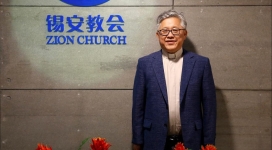BAGHDAD, Iraq (AP) - The blasts came in quick succession in the Baghdad street of stores and auto shops. The first two brought people rushing in to help the wounded then the car explosion ripped through the crowd, killing at least 12 and wounding 56.
The rapid bombings hit Industry Street in a mainly Christian neighborhood of the capital Wednesday, leaving it strewn with bodies, burning cars, and damaged buildings the latest attack in Baghdad, the epicenter of mounting violence in Iraq.
The number of car bombs and roadside bombs that went off or were found and defused over the past week in Baghdad is the highest so far this year, U.S. military spokesman Maj. Gen. William B. Caldwell said.
Four U.S. soldiers patrolling in Baghdad were killed by gunmen Wednesday, the U.S. military said, also announcing the deaths of two other soldiers a day earlier in Baghdad and the northern city of Kirkuk. The deaths brought to 21 the number of Americans killed in combat since Saturday.
In the midst of the bloodshed, Baghdad residents cant even tell whom to blame anymore Sunni insurgents such as al-Qaida in Iraq, Shiite death squads hunting Sunnis or Sunni groups seeking to kill Shiites.
Everybody knows this is a Christian neighborhood, they are neither Sunnis or Shiites, so why are they doing this to them? a man on Industry Street said, identifying himself by his first name, Hamdi.
The use of strings of bombs is a common tactic among Sunni insurgents aimed at drawing in rescue workers and onlookers with an initial blast to cause mass deaths with the latter ones.
But the main cause of deaths the past three months has been sectarian violence, Shiite-Sunni murders in a cycle of killings, Caldwell said.
Under pressure to stop the sectarian bloodshed, the Iraqi government pulled a brigade of about 700 police officers out of service Wednesday for investigation of suspected ties to death squads.
It was the first time that the government had taken such dramatic action to discipline security forces over possible links to militiamen. Baghdads Sunnis widely fear the Shiite-led police, saying that they are infiltrated by militias and accusing them of cooperating with death squads who snatch Sunnis and kill them.
The brigade was responsible for a region of northeast Baghdad with a slight Shiite majority, where gunmen on Sunday kidnapped 24 workers from a frozen food factory. Hours later, the bodies of seven of the workers were found dumped in a district miles away.
Sunni politicians have said all those who were kidnapped were Sunnis. They blamed Shiite militias for the abduction and accused police of allowing the gunmen to escape and move freely with their captives.
Brig. Abdul-Karim Khalaf, the chief ministry spokesman, said the brigade was being investigated because it didnt respond quickly to the kidnapping.
Caldwell said the police brigade had been ordered to stand down and was undergoing retraining. He said some were being investigated and that any found to have militia ties would be removed.
The government of Iraq was very clear as we go through this process that if that (unit) comes out at 30 percent of what it went in with, thats OK with the government of Iraq, he told a Baghdad news conference.
There is clear evidence that there was some complicity in allowing death squad elements to move freely when, in fact, they were supposed to have been impeding their movement, Caldwell said.
The U.S. military appeared to have a key role in getting the brigade sidelined. Caldwell said problems with the unit had emerged during a broad brigade-by-brigade assessment of police in Baghdad carried out by the U.S. military over the summer and the decision was made by the Interior Ministry to act Tuesday.
U.S. forces have been carrying out raids and arrests of militia members for the past month as part of a wide-scale U.S.-Iraqi sweep of Baghdad launched in August, which has seen the number of American troops in the capital double.
Forces have been moving from neighborhood to neighborhood, searching houses, confiscating weapons and arranging services like water and electricity for residents in an attempt to stop sectarian violence and insurgent attacks. The rise in U.S. deaths in recent days may be linked to their increased presence in the capital, commanders have said.
But at the same time, Sunnis have accused the Shiite-led government of balking at sending its security forces against the Shiite militias, many of which are linked to parties in the coalition.
The suspended brigade had about 650-700 members, and the Iraqi Interior Ministry said Tuesday that its commander of the unit, a lieutenant colonel, has been detained for investigation. The major general who oversees the brigade and two others in the area has been suspended temporarily and ordered transferred.
Khalaf said a random selection of troops in the suspended unit were being investigated for ties to militias.
At the same time, Sunni-led insurgents have continued their attacks targeting civilians, Iraqi officials and U.S. and Iraqi troops.
Car bombs, as well as other explosions and shootings, killed 34 people across the country Wednesday. The Industry Street blast was the deadliest of the day.
Hours after that attack after sunset and the end of the days Ramadan fast gunmen opened fire on a popular cafe in an overwhelmingly Shiite part of southeast Baghdad, killing four patrons and wounding seven others.







